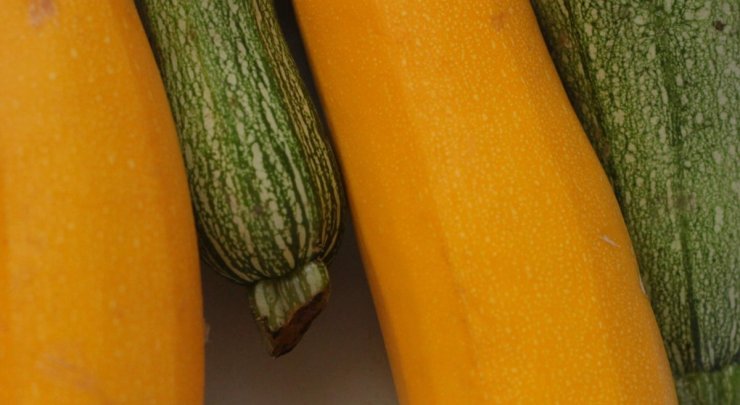Summer squash grows quickly and easily. Some, like zucchini, are known as prolific producers. And they add some beautiful color to your garden with their vivid yellow-orange flowers and bright skins. They’re also prone to diseases and susceptible to pests, which is why some summer squash companion plants make good additions to any garden.
Companion plants complement one another in a garden in several ways. Some repel harmful insects, while others attract beneficial insects and pollinators that other plants need to thrive. Some provide shade to their neighbors and others add nutrients to the soil.
In other words, companion plants are basically the neighbor who picks up your packages and feeds your cats while you’re out of town, invites you over for a summer barbecue, bakes extra bread every weekend, and drops some off to you when it’s still warm from the oven. That’s exactly the kind of neighbor your summer squash needs in order to live a happy life in your garden.

10 Summer squash companion plants to grow this year
1. Beans: Beans are, of course, one of the three sisters grouping of corn, beans, and squash. Squash acts as a barrier against weeds and helps retain moisture. Corn provides a “pole” for beans to climb, and beans pull nitrogen from the air and add it to the soil.
2. Borage: With brilliant, deep blue star-shaped flowers, borage makes a beautiful addition to any garden. The edible flowers and leaves have hints of honey and cucumber, making them a tasty addition to salads. For summer squash, however, borage is especially helpful, as it attracts beneficial insects and honey bees are especially fond of the nectar. Those same honey bees also help pollinate your squash, ensuring an abundant harvest.
3. Catnip: As you can tell by their moniker, squash bugs are very much attracted to the summer squash in your garden, where they attack the leaves of your plants, causing them to wither, blacken, become brittle, and eventually die. Catnip may help repel squash bugs, as well as aphids. And since catnip theoretically attracts cats, that may be beneficial in keeping rodents and other pests out of your garden.
4. Chives: Chives are excellent summer squash companion plants. They are pretty much effortless to grow, they’re darn tasty, and chive flowers attract bees. They also deter cucumber beetles and aphids
5. Corn: Corn isn’t just a classic summer squash companion plant; it’s one of the three sisters, along with beans, that have been grown together for thousands of years. Corn and squash have a symbiotic relationship. The broad leaves of the squash plant help retain moisture in the soil and shade out weeds that can harm young corn plants. In return, corn provides an ideal environment for beans to thrive, and beans enrich the soil, providing nutrients that squash needs to grow healthy and abundant.
6. Garlic: Like chives, garlic also requires almost no effort on your part. Additionally, this allium deters snails and slugs and may act as a disinfectant, limiting the spread of powdery mildew.
7. Marigolds: Marigolds are another stunning addition to any garden. They grow well in all those “in-between” spaces and they attract pollinators, as well as ladybugs.
8. Nasturtium: These edible flowers are darlings of the companion planting world. So many harmful insects love nasturtiums that they are frequently used as a trap crop to reduce pests and attract pollinators.
9. Peas: Peas might seem like an odd choice in a list of summer squash companion plants. The two vegetables actually grow and mature at very different times of the year. Peas are cool weather crops, most often grown in early spring or late fall. Summer squash is, of course, a summer vegetable. However, like beans, peas fix nitrogen in the soil, helping prepare a rich environment for squash to thrive.
10. Radishes: There are plenty of reasons to love radishes. They grow quickly, add a wonderful crunch and spice to your salads, and they help deter squash vine borers, which tunnel through the stems of squash plants, depriving the leaves and fruit of moisture.
Bonus. Sunflowers: As summer squash companion plants go, sunflowers can be a little tricky. Why? Squash plants need full sun to produce. Generally speaking, more sun is better. But if the weather gets too hot for too long, your squash plants may droop with stress. Sunflowers can help shade your squash from overly intensive sunlight. Of course, sunflowers also attract pollinators like bees and butterflies, which help your squash produce. Just be aware of the sunlight factor if you opt for sunflowers as a neighbor for your squash.
Want to know more about this ubiquitous garden favorite? Learn more about squash in Happiness is Summer Squash: All You Need to Know about Growing Summer Squash. Discover the history of this delicious vegetable, learn about different varieties of squash, get planting tips and tricks, and find out all about growing, harvesting, cooking, and eating this wonderful vegetable.


 Previous
Previous

